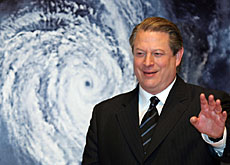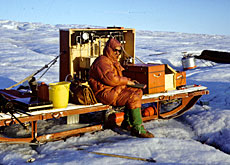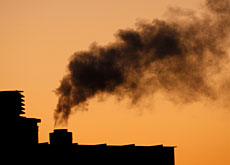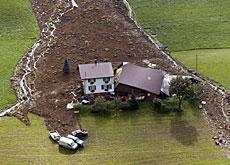“The Truth” earns Gore Nobel Peace Prize

Former US vice president Al Gore and the Geneva-based United Nations Intergovernmental Panel on Climate Change (IPCC) have won the 2007 Nobel Peace Prize.
Swiss climate researchers have hailed the decision, saying it is also a recognition of their work and that it will boost efforts to combat global warming.
Gore and the IPCC were honoured on Friday for their efforts to build up and disseminate knowledge about man-made climate change and to lay the foundations for fighting it.
The former vice president, who won an Academy Award earlier this year for his film “An Inconvenient Truth”, had been widely tipped to win the prestigious prize but he and the agency will share it.
“His strong commitment, reflected in political activity, lectures, films and books, has strengthened the struggle against climate change,” the citation said.
“He is probably the single individual who has done most to create greater worldwide understanding of the measures that need to be adopted.”
Gore called the award meaningful because of his co-winner, calling the IPCC the “world’s pre-eminent scientific body devoted to improving our understanding of the climate crisis.”
He warned that global warming was not a political issue but a worldwide crisis.
“We face a true planetary emergency. It is a moral and spiritual challenge to all of humanity,” he said. “It is also our greatest opportunity to lift global consciousness to a higher level.”
Bern University has played a part in Gore’s achievement. Climate research carried out there, including the retreat of alpine glaciers and greenhouse gas measurements in Antartic ice cores, formed a basis for his successful documentary.
“We are naturally proud of our scientific results,” said Martin Grosjean, head of the university’s Oeschger Centre for Climate Change Research.
“Al Gore and this year’s IPCC reports took the results of climate research to a whole new level that made them understandable for more people.”
Fighting climate change
The committee cited the IPCC for its two decades of scientific reports that have “created an ever-broader informed consensus about the connection between human activities and global warming.
Thousands of scientists and officials from over one hundred countries including Switzerland have collaborated to achieve greater certainty as to the scale of the warming.”
It went on to say that because of its efforts global warming has been increasingly recognized. In the 1980s it “seemed to be merely an interesting hypothesis, the 1990s produced firmer evidence in its support. In the last few years, the connections have become even clearer and the consequences still more apparent.”
Martin Beniston, a climatologist at Geneva University who has worked for the IPCC, welcomed the decision.
“It gives the IPCC extra legitimacy,” he told swissinfo. “It will help shut up those who still openly deny global warming.”
This year, climate change has been at the top of the world agenda, putting an end to a frustrating wait for many scientists.
“Climate change has effects on water conservation, on energy and food production. That leads to fighting over resources and to forced migration,” Grosjean told swissinfo.
“It’s not just about glaciers melting and the disappearance of a few plants.”
The UN climate panel has been releasing its reports, talks on a replacement for the 1997 Kyoto Protocol on climate are set to resume. And on Europe’s northern fringe, where the awards committee works, International Polar Year has underscored concern about the melting Arctic.
swissinfo with agencies
Albert Arnold “Al” Gore, Jr. was born on March 31, 1948.
Gore served in the United States House of Representatives (1977–85) and the United States Senate (1985–93) representing Tennessee.
From 1993 to 2001, he was the forty-fifth vice president of the United States, under Bill Clinton.
He lost the 2000 presidential election in controversial circumstances.
Today, Gore lectures widely on global warming, which he calls “the climate crisis”, and in 2006 he produced the documentary “An Inconvenient Truth,” which discusses global warming and the environment.
The Intergovernmental Panel on Climate Change was set up in 1988 by the UN Environment Programme and the World Meteorological Organization.
Its role is to advise governments about the causes and the effects of climate change, as well as about options for adaptation and mitigation.
Run from Geneva, it draws on work by about 2,500 climate scientists from more than 130 nations.
It has issued three assessment reports this year, with another one due next month.

In compliance with the JTI standards
More: SWI swissinfo.ch certified by the Journalism Trust Initiative



You can find an overview of ongoing debates with our journalists here. Please join us!
If you want to start a conversation about a topic raised in this article or want to report factual errors, email us at english@swissinfo.ch.